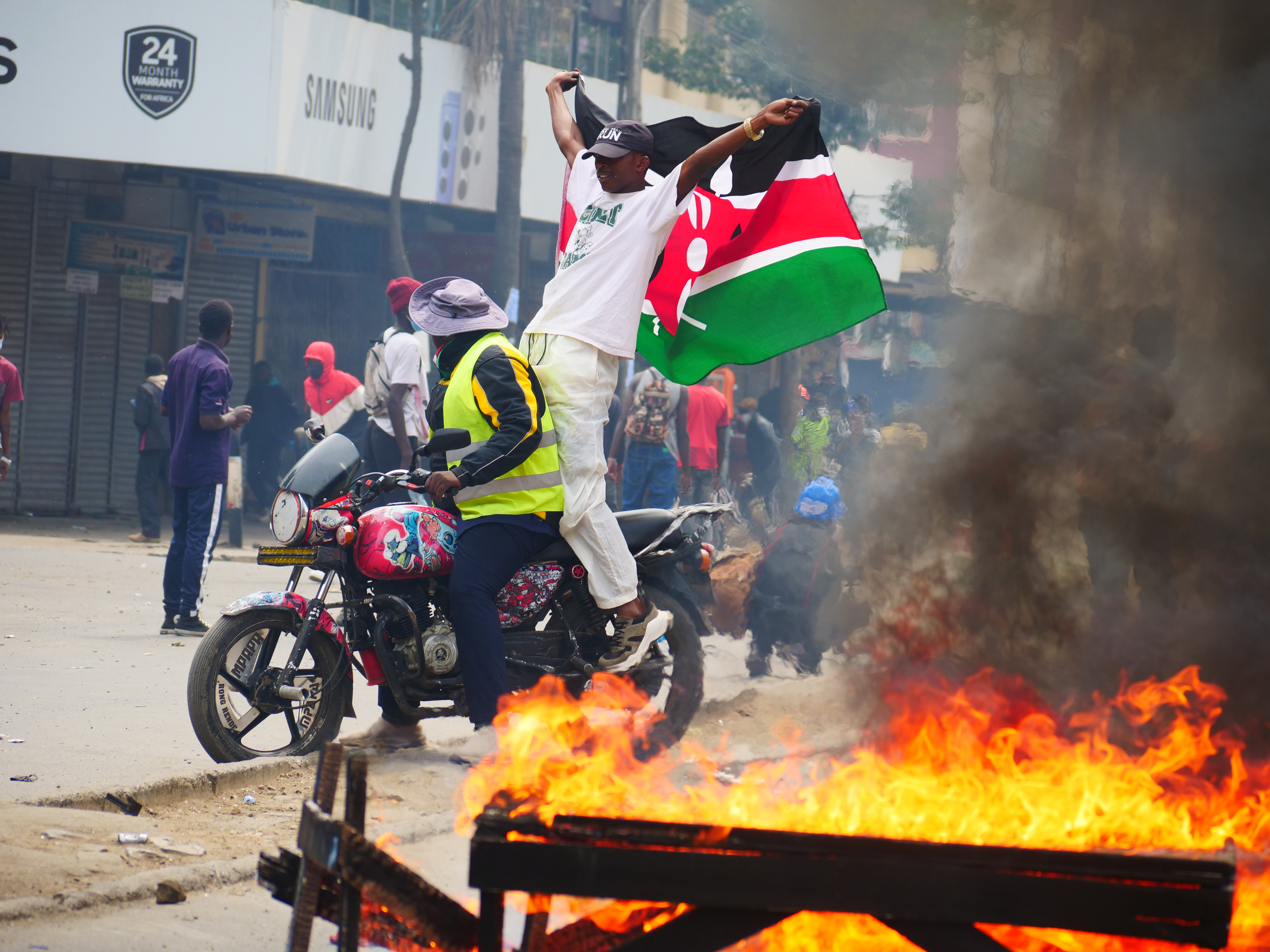The crux of the struggle lies in reclaiming the soul of Kenya from a generation that became malevolent during public duty.
The recent protests, sparked by a youth movement rejecting the Finance Bill 2024, have grown into widespread demonstrations confronting deep-seated issues within Kenya. What started as peaceful gatherings in Nairobi, with the prominent presence of young women denouncing the proposed Finance Bill, deteriorated into a storming of parliament and violent confrontations with police, resulting in over 50 civilian deaths, in the wake of abductions by state agents.
The country is facing an unprecedented political crisis. The Kenyan military has been deployed to support policing efforts and the nationwide protests show no signs of abating. President William Ruto is under siege and the former jet-setting head of state has not left the country since the protests began in June.
The Gen Z-led protests are evolving into a formidable political uprising. 80 percent of Kenya’s population is below 35 years of age and the protestors on streets and online seethe with defiance, embodying a revolt that is not organising around central authority, tribal divisions, and regional politics, aiming to dismantle a colonial legacy maintaining Kenya’s political power matrix.
Kenya's path from British colony to independence (1920-1963) was watered with the blood of resistance against white oppression, violence, and land exploitation and expropriation. The guerrilla rebellion by the Kenya Land and Freedom army from 1952-1960 became a catalyst for independence in 1963. Though the white minority rule ended, a local elite upheld a system of power, perpetuating mass oppression and economic disenfranchisement, keeping citizens locked in a cycle of ethnic based rivalry for political domination of the state.
The recent protests stem from long-standing misrule, executive abuses, economic oppression, and systemic violence endured by the people. After 60 years of independence, a new public aims to dismantle colonial power structures, advocating for a reimagining of Kenya centred on democratic principles and citizen empowerment, in alignment with the vision of the Constitution of Kenya, 2010.
The youth of Kenya have historically been viewed as expendable, used for political gain by the ruling class. President William Ruto, elected in 2022 with support from the youth-oriented “Hustler movement’’, pledged grassroots political change from bottom up but instead contributed to a reinforcement of the existing status quo.
This is a generation that weathered a global pandemic, bearing the harsh impacts of COVID-19 policies that worsened Africa's ongoing health and economic crises. Emerging into adulthood amidst post-COVID desolation, they witnessed the decapitation of vital sectors like Health and Education, as public funds were diverted to service foreign debt and modernising the policing infrastructure. As the fresh-faced victims of an irredeemably corrupt political elite, they inherit a debt-ridden nation lacking accountability, feeling the burden of a government that arrogantly exploits the vulnerable through taxation.
The crux of the struggle is in reclaiming the soul of Kenya from a generation that became malevolent during public duty. The Gen Z-led movement isn't just fighting for their stifled futures; they are striving to free their parents from bondage, aiming to sculpt a bright future for all Kenyans, regardless of affiliations, nurturing a shared vision of freedom and prosperity.

The entrenched political elite remains oblivious to the shifting socio-political paradigm, resorting to oppressive state forces to combat this emerging challenge to the established order. Due to political hubris, this generational movement confounds analysts who fail to grasp the intrinsic motivations of a politically awakened and civic conscious populace rallying against a corrupt governance system. No one is spared—neither revered former leaders nor the influential church.
Kenya’s youth embody a new political era post the Constitution of Kenya 2010 (CoK2010), placing their faith in this symbolic green book of ideals, envisioning a utopian Kenyan future. Laden with the weight of history and the legacy of their predecessors, they navigate a precarious future, with protests expanding to draw in the Kenyan diaspora in solidarity marches outside Kenyan embassies in Washington, London, Berlin, and The Hague.
This movement has grown beyond mere domestic politics to scrutinize the global neoliberal structures that empower Kenyan political elites at the expense of the populace. International bodies like the IMF and World Bank face criticism for perpetuating African underdevelopment through debt traps and policies that deepen poverty and inequality.
Despite the audacity of the mission, risks and uncertainties loom large as people-led movements in Kenya have faced retaliation by establishment actors to dilute genuine objectives and weaken solidarity through internal divisions. The Ruto administration is wrestling to regain stability after the initial civilian protests, with a consolidation of political alliances to uphold the presidency's legitimacy.
The protests have brought the country to a critical juncture—a nation striving to break free from the burdens of its historical legacy, led by a generation that wants to remain unseen. Kenya now treads uncharted territory, balancing between the regressive past and an ambiguous future.
Inspired by Nicholas Klein's vision, the renowned American trade unionist, the protests have navigated the stages of neglect and ridicule, now confronting the harsh reality of state machinery. The poignant loss of young lives emphasizes the treacherous road ahead. While the protests rage on without guarantees of easy victory, the eyes of Africa are fixed on Kenya, where a neo-colonial nation once shrouded in ambiguity now stands as a beacon of change.
Oyunga Pala is a Kenyan journalist, editor and a curator of The Elephant’s series on the Gen Z revolution. He resides in the Netherlands.
Call to Action
ZAM believes that knowledge should be shared globally. Only by bringing multiple perspectives on a story is it possible to make accurate and informed decisions.
And that’s why we don’t have a paywall in place on our site. But we can’t do this without your valuable financial support. Donate to ZAM today and keep our platform free for all. Donate here.


